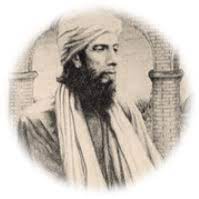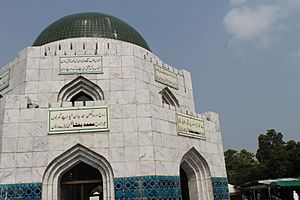Mian Muhammad Bakhsh facts for kids
Quick facts for kids
Mian Muhammad Baksh
میاں محمد بخش |
|
|---|---|

Photograph of Bakhsh
|
|
| Born | c. 1830 Khari Sharif, Sikh Empire (present-day Azad Jammu and Kashmir, Pakistan) |
| Died | 1907 Khari Sharif, Jammu and Kashmir, British India (present-day Azad Jammu and Kashmir, Pakistan) |
| Occupation | Poet |
| Genre | Sufi poetry |
| Notable works | Sayful Mulūk (his book of poetry) |
Mian Muhammad Bakhsh (Punjabi: میاں محمد بخش) was a famous Punjabi Sufi poet from the 1800s. He was born around 1830 in Kashmir, which is now part of Pakistan. His family had roots in Gujrat, Punjab.
He wrote 18 books during his 77 years of life. He is best known for his long poems, called epics. His most famous works are "Saiful Maluk" and "Mirza Sahiban". Most of his writings are in Punjabi, especially the Pothwari dialect. He also wrote one book in Persian.
Mian Muhammad Bakhsh lived during the time of British rule in South Asia. He used his poetry to express feelings against this rule. Today, he is highly respected across Punjab and Azad Jammu and Kashmir. Many see him as a link to modern Punjabi literature.
Contents
His Early Life and Education
Mian Muhammad Bakhsh was born around 1830 in Khari Sharif, Kashmir. This was during the time of the Sikh Empire. His family belonged to the Gujjar group of Punjabi people.
He grew up in a very religious home. He received his first lessons there. Later, he and his older brother, Mian Bahaval, went to study in a nearby village. They learned religious sciences at a madrassah (religious school). His teacher was Hafiz Ghulam Hussain.
Mian Muhammad loved poetry from a young age. He especially enjoyed reading "Yusuf o Zulaikha" by Jami. Even as a child, he showed a special talent for writing verses.
A Spiritual Path
When Mian Muhammad was only fifteen, his father became very ill. His father decided to pass on his spiritual knowledge. He chose Mian Muhammad to continue the family's spiritual tradition. Everyone agreed that the young man was suitable.
Mian Muhammad, however, felt his older brother should have the honor. But his father insisted. He gave Mian Muhammad a special blessing. Soon after, his father passed away. Mian Muhammad stayed at home for four more years. Then, at age nineteen, he moved to a special spiritual center called a khānqāh. He lived there for the rest of his life. Unlike his brothers, he focused only on spiritual matters and never married.
Finding a Spiritual Teacher
Even though his father had given him a spiritual role, Mian Muhammad felt he needed a formal teacher. After finishing his studies, he began to travel. He looked for quiet places to pray and practice spiritual exercises. He avoided crowds and focused on his journey.
He eventually found his Sufi master, Ghulam Muhammad. This teacher helped him grow spiritually. Mian Muhammad is also said to have visited Srinagar. There, he learned from another respected teacher, Shaikh Ahmad Vali.
His Poetic Works
As Mian Muhammad Bakhsh grew in his spiritual journey, he became more interested in writing poetry. One of his first poems was a qasidah, a poem praising his spiritual guide. He started by writing shorter poems. Then, he began to compose longer stories in verse.
His poetry uses a mix of Punjabi dialects. These include Majhi, Potohari, and Hindko. He also used many words from Persian and Arabic. Mian Muhammad Bakhsh shared his deep spiritual thoughts. He wrote them in Punjabi, which was his native language. This made his ideas accessible to many people.
Some of his well-known works include:
- Siharfi
- Sohni Mahiwal
- Tuhfah-e Miran
- Tuhfah-e- Rasuliyah
- Shirin Farhad
- Mirza Sahiban
- Sakhi Khavass Khan
- Shah Mansur
- Gulzar-e Faqir
- Hidayatul Muslimin
- Panj Ganj
- Masnavi-e Nīrang-e ‘Ishq
His most famous work is "Safarul ‘Ishq" (Journey of Love). It is better known as "Saif ul Maluk".
Death and Lasting Impact
Mian Muhammad Bakhsh passed away in 1907. He was buried in Khari Sharif, Pakistan. His tomb is near his spiritual ancestor, Damriyan Wali Sarkar. Many people still visit his tomb today. They go there hoping to receive spiritual blessings.
In 2016, a special event was held in Islamabad, Pakistan. Scholars spoke about Mian Muhammad Bakhsh's importance. They said his poetry spread messages of peace and kindness. They also encouraged young people to learn from national heroes like him. Mian Muhammad Bakhsh's life and work continue to inspire people. He helps guide them towards a happy and successful life.
 | Aurelia Browder |
 | Nannie Helen Burroughs |
 | Michelle Alexander |


